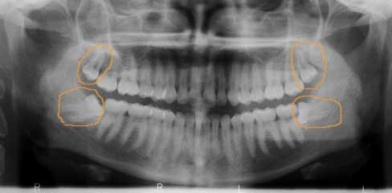Wisdom teeth
Wisdom teeth problems are very common among students. Wisdom teeth usually erupt at the age of 19 to 20. This eruption usually continues until the age of 25, but in 90% of young adults it will remain partial due to lack of space. Eruption is often periodic and painful. Pain, aching and gum sensitivity may last for up to several weeks.
The gums around a partially erupted wisdom tooth get inflamed easily, as food and dirt lodge in the area between the tooth and the gum. Cleaning the area is usually difficult. Inflammatory symptoms are often associated with lower wisdom teeth. Poor oral hygiene predisposes the gums to inflammatory symptoms. Over half of 20-year-olds need to have at least one wisdom tooth extracted. Not all wisdom teeth need to be extracted. The dentist will assess the need for extraction during a dental check-up.
Self-care
Good oral hygiene alleviates wisdom tooth symptoms. A partially erupted wisdom tooth can and should be cleaned daily. Symptoms related to an erupting wisdom tooth and the gums around it can be temporarily treated with over-the counter painkillers and chlorhexidine-containing mouthwash.
When should you seek treatment?
If the pain in the wisdom tooth area persists for a long time or is recurrent and the above self-care measures do not help, you should seek treatment. More serious and more frequent wisdom tooth symptoms include fever and/or difficulty opening the mouth. If these occur, you should immediately seek treatment.
Treatment of wisdom teeth
The inflamed wisdom tooth area will be first cleaned. Antibiotics may be required. If an upper wisdom tooth has erupted and bites onto the inflamed mucosa of a lower wisdom tooth, the upper wisdom tooth can be drilled down or extracted.

Usually a wisdom tooth is extracted when the acute stage has eased. A dental x-ray is required when planning the extraction.
Symptomless wisdom teeth may also have to be extracted if the dentist thinks they may cause problems in the future. A wisdom tooth treatment plan is part of students’ first oral examination by a dentist.
Partially erupted or non-erupted wisdom teeth will be extracted surgically under local anaesthesia.
Information sources: The Finnish Medical Society Duodecim: Terveysportti, Lääkärin tietokanta database
FSHS Dentist / 18 September 2024


